专题08 完形填空 (含答案)-2024-2025学年六年级英语下学期期末专项练习(牛津译林版)
文档属性
| 名称 | 专题08 完形填空 (含答案)-2024-2025学年六年级英语下学期期末专项练习(牛津译林版) | 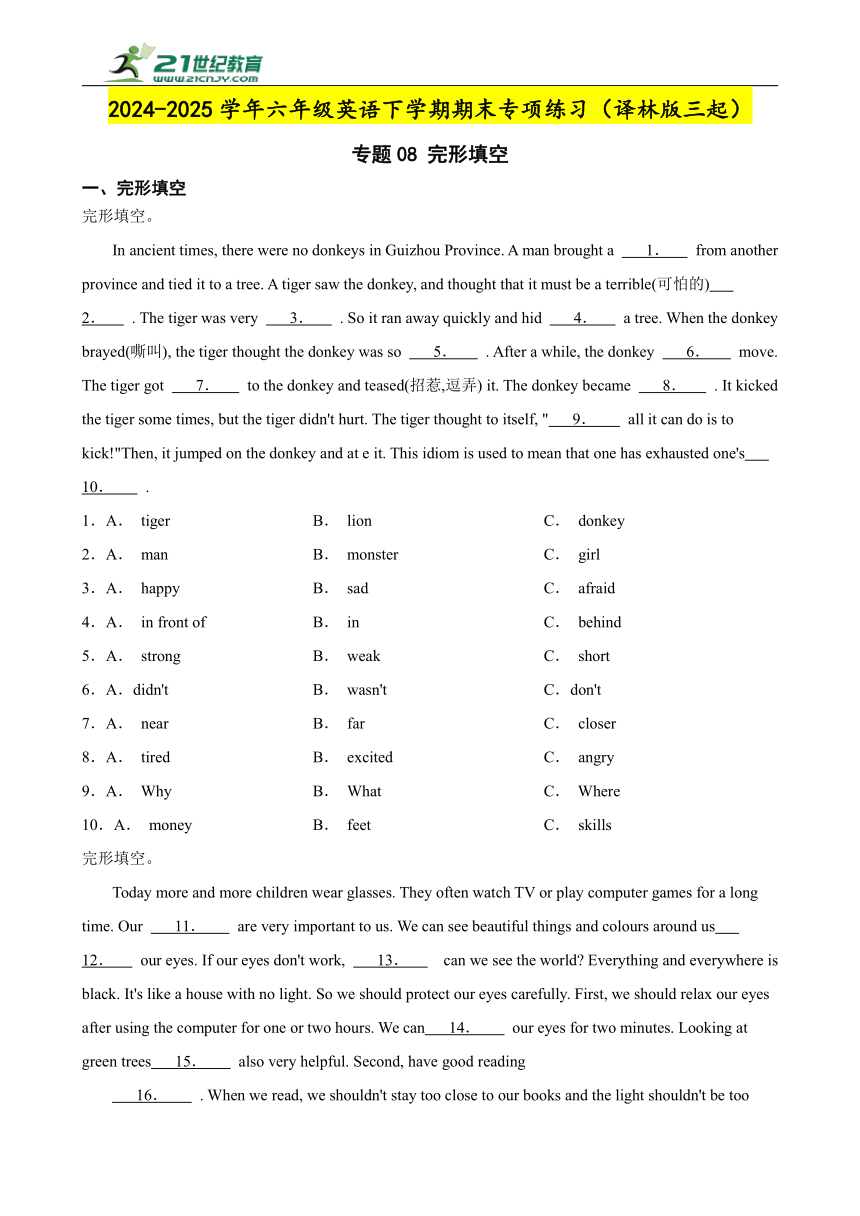 | |
| 格式 | docx | ||
| 文件大小 | 52.1KB | ||
| 资源类型 | 试卷 | ||
| 版本资源 | 牛津译林版 | ||
| 科目 | 英语 | ||
| 更新时间 | 2025-05-16 08:26:32 | ||
图片预览

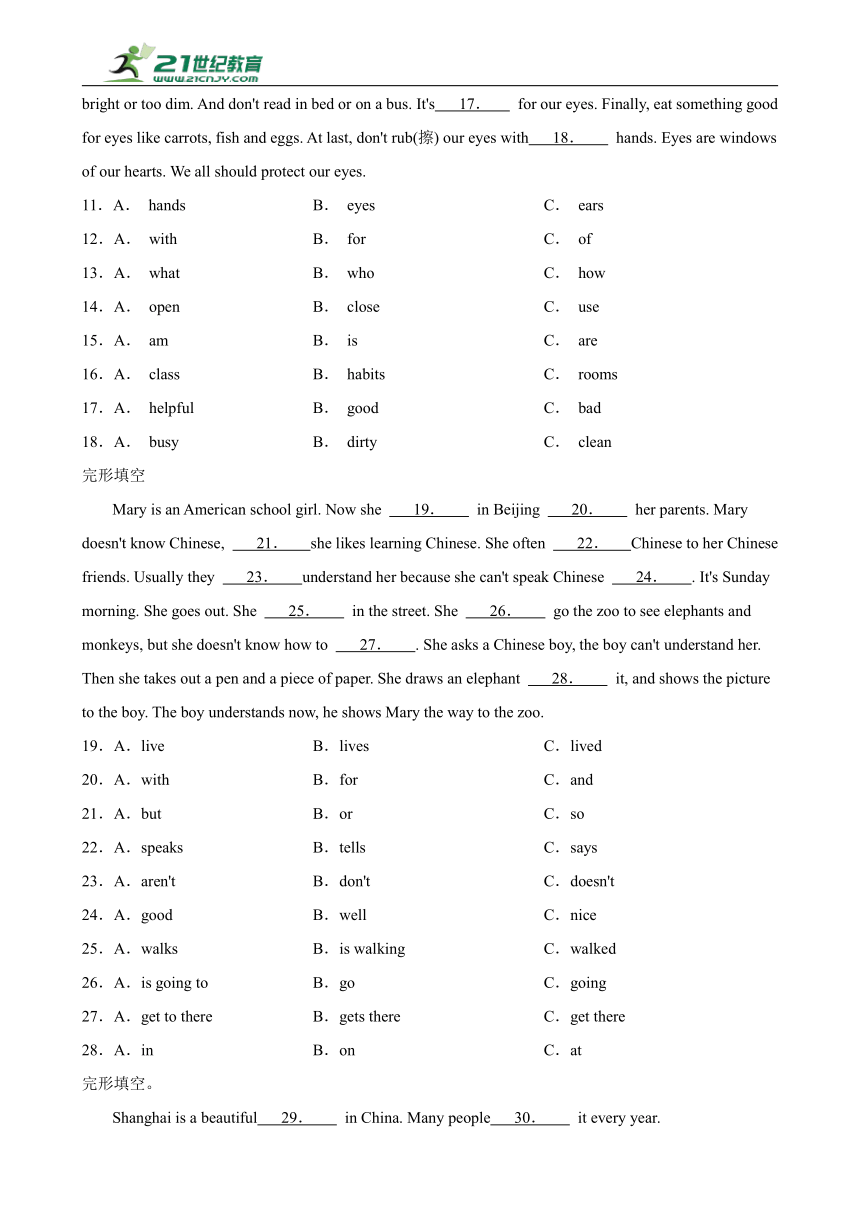
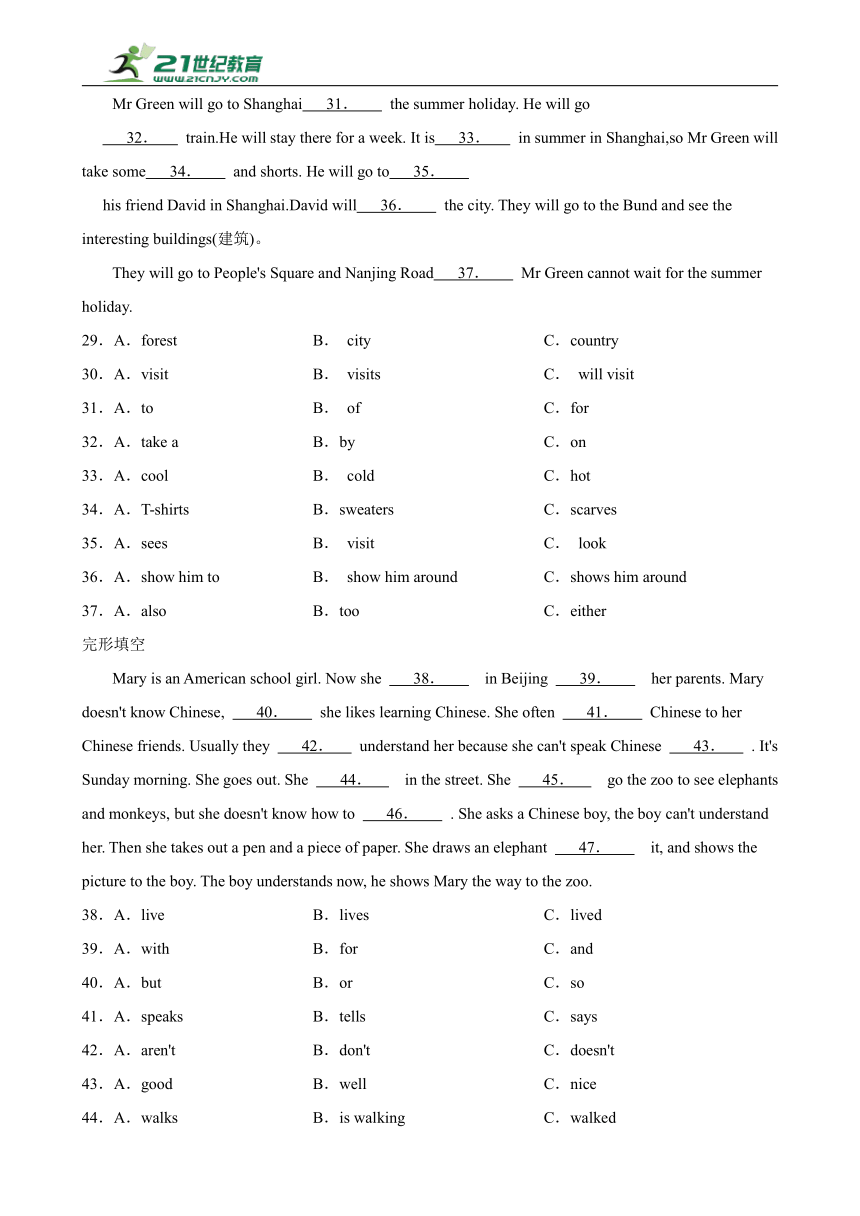
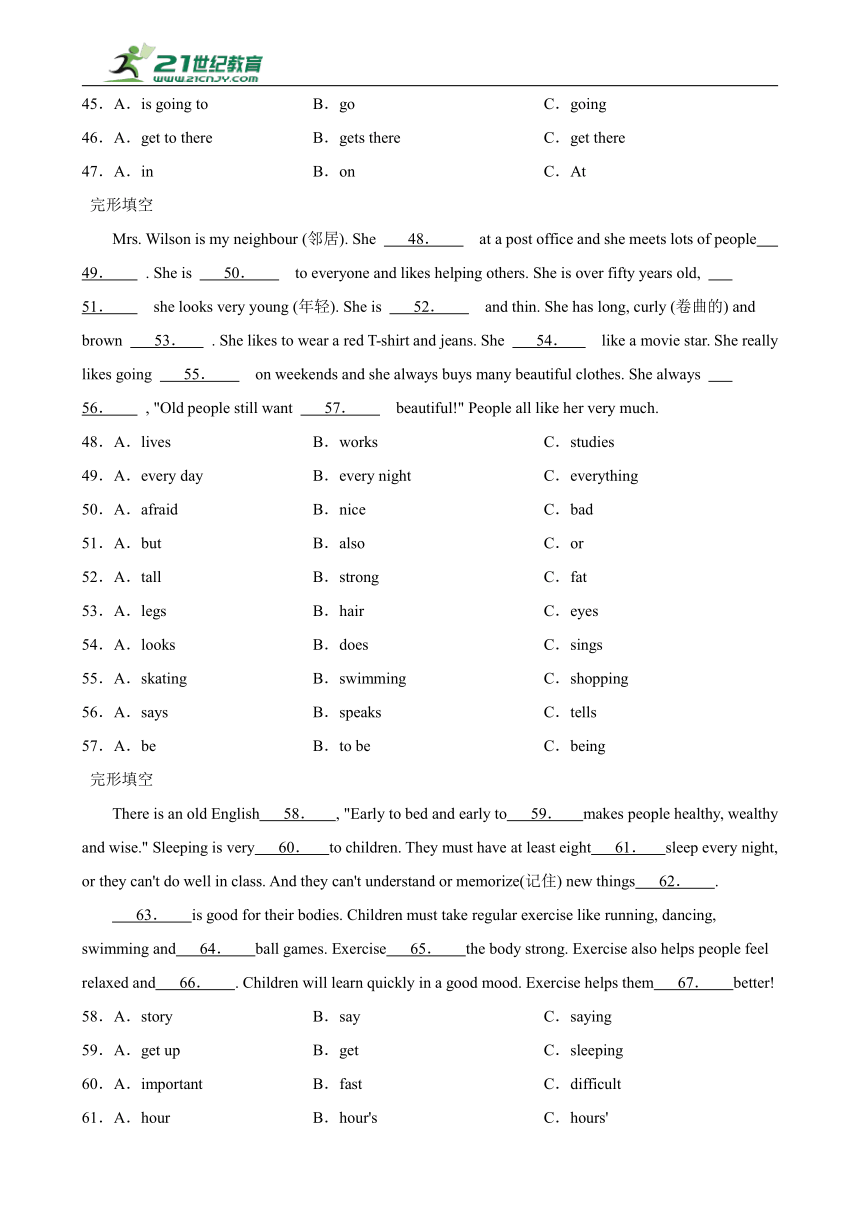
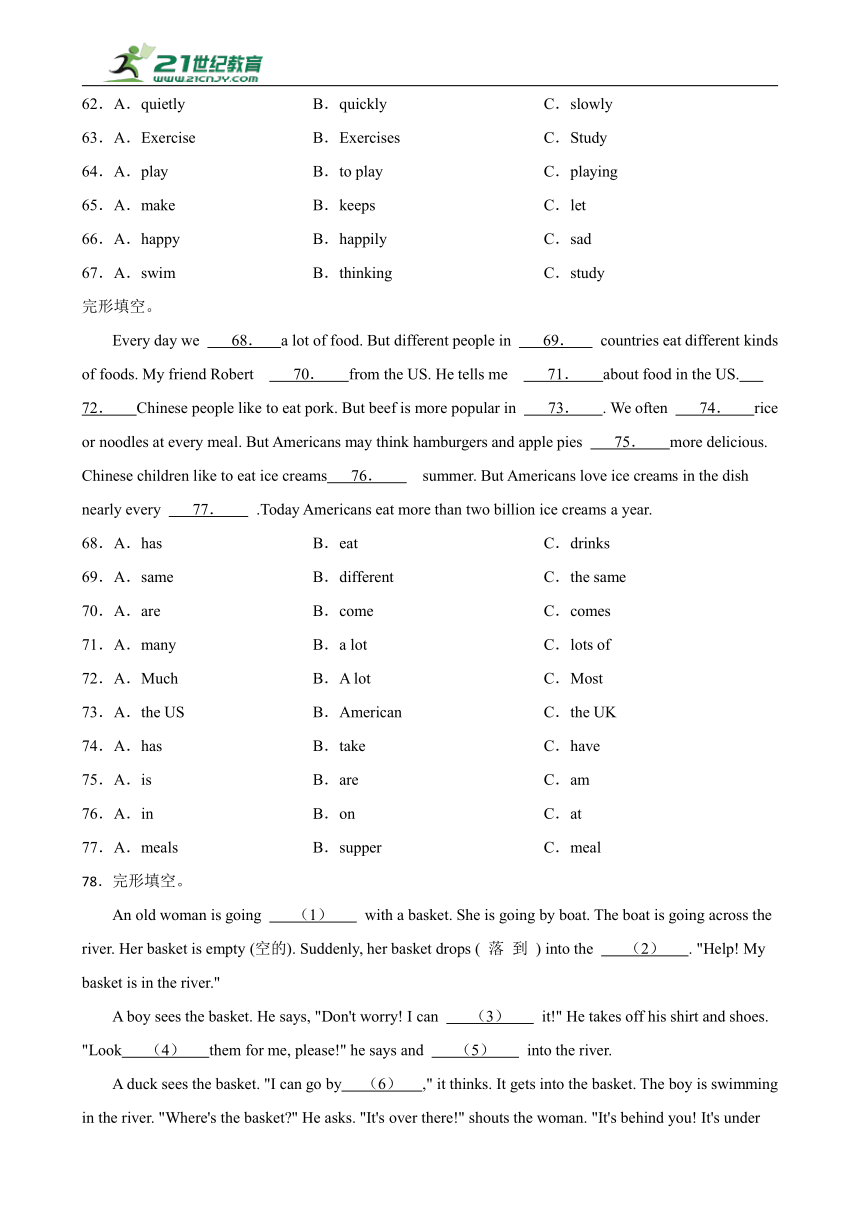
文档简介
2024-2025学年六年级英语下学期期末专项练习(译林版三起)
专题08 完形填空
一、完形填空
完形填空。
In ancient times, there were no donkeys in Guizhou Province. A man brought a 1. from another province and tied it to a tree. A tiger saw the donkey, and thought that it must be a terrible(可怕的) 2. . The tiger was very 3. . So it ran away quickly and hid 4. a tree. When the donkey brayed(嘶叫), the tiger thought the donkey was so 5. . After a while, the donkey 6. move. The tiger got 7. to the donkey and teased(招惹,逗弄) it. The donkey became 8. . It kicked the tiger some times, but the tiger didn't hurt. The tiger thought to itself, " 9. all it can do is to kick!"Then, it jumped on the donkey and at e it. This idiom is used to mean that one has exhausted one's 10. .
1.A. tiger B. lion C. donkey
2.A. man B. monster C. girl
3.A. happy B. sad C. afraid
4.A. in front of B. in C. behind
5.A. strong B. weak C. short
6.A.didn't B. wasn't C.don't
7.A. near B. far C. closer
8.A. tired B. excited C. angry
9.A. Why B. What C. Where
10.A. money B. feet C. skills
完形填空。
Today more and more children wear glasses. They often watch TV or play computer games for a long time. Our 11. are very important to us. We can see beautiful things and colours around us 12. our eyes. If our eyes don't work, 13. can we see the world Everything and everywhere is black. It's like a house with no light. So we should protect our eyes carefully. First, we should relax our eyes after using the computer for one or two hours. We can 14. our eyes for two minutes. Looking at green trees 15. also very helpful. Second, have good reading
16. . When we read, we shouldn't stay too close to our books and the light shouldn't be too bright or too dim. And don't read in bed or on a bus. It's 17. for our eyes. Finally, eat something good for eyes like carrots, fish and eggs. At last, don't rub(擦) our eyes with 18. hands. Eyes are windows of our hearts. We all should protect our eyes.
11.A. hands B. eyes C. ears
12.A. with B. for C. of
13.A. what B. who C. how
14.A. open B. close C. use
15.A. am B. is C. are
16.A. class B. habits C. rooms
17.A. helpful B. good C. bad
18.A. busy B. dirty C. clean
完形填空
Mary is an American school girl. Now she 19. in Beijing 20. her parents. Mary doesn't know Chinese, 21. she likes learning Chinese. She often 22. Chinese to her Chinese friends. Usually they 23. understand her because she can't speak Chinese 24. . It's Sunday morning. She goes out. She 25. in the street. She 26. go the zoo to see elephants and monkeys, but she doesn't know how to 27. . She asks a Chinese boy, the boy can't understand her. Then she takes out a pen and a piece of paper. She draws an elephant 28. it, and shows the picture to the boy. The boy understands now, he shows Mary the way to the zoo.
19.A.live B.lives C.lived
20.A.with B.for C.and
21.A.but B.or C.so
22.A.speaks B.tells C.says
23.A.aren't B.don't C.doesn't
24.A.good B.well C.nice
25.A.walks B.is walking C.walked
26.A.is going to B.go C.going
27.A.get to there B.gets there C.get there
28.A.in B.on C.at
完形填空。
Shanghai is a beautiful 29. in China. Many people 30. it every year.
Mr Green will go to Shanghai 31. the summer holiday. He will go
32. train.He will stay there for a week. It is 33. in summer in Shanghai,so Mr Green will take some 34. and shorts. He will go to 35.
his friend David in Shanghai.David will 36. the city. They will go to the Bund and see the interesting buildings(建筑)。
They will go to People's Square and Nanjing Road 37. Mr Green cannot wait for the summer holiday.
29.A.forest B. city C.country
30.A.visit B. visits C. will visit
31.A.to B. of C.for
32.A.take a B.by C.on
33.A.cool B. cold C.hot
34.A.T-shirts B.sweaters C.scarves
35.A.sees B. visit C. look
36.A.show him to B. show him around C.shows him around
37.A.also B.too C.either
完形填空
Mary is an American school girl. Now she 38. in Beijing 39. her parents. Mary doesn't know Chinese, 40. she likes learning Chinese. She often 41. Chinese to her Chinese friends. Usually they 42. understand her because she can't speak Chinese 43. . It's Sunday morning. She goes out. She 44. in the street. She 45. go the zoo to see elephants and monkeys, but she doesn't know how to 46. . She asks a Chinese boy, the boy can't understand her. Then she takes out a pen and a piece of paper. She draws an elephant 47. it, and shows the picture to the boy. The boy understands now, he shows Mary the way to the zoo.
38.A.live B.lives C.lived
39.A.with B.for C.and
40.A.but B.or C.so
41.A.speaks B.tells C.says
42.A.aren't B.don't C.doesn't
43.A.good B.well C.nice
44.A.walks B.is walking C.walked
45.A.is going to B.go C.going
46.A.get to there B.gets there C.get there
47.A.in B.on C.At
完形填空
Mrs. Wilson is my neighbour (邻居). She 48. at a post office and she meets lots of people 49. . She is 50. to everyone and likes helping others. She is over fifty years old, 51. she looks very young (年轻). She is 52. and thin. She has long, curly (卷曲的) and brown 53. . She likes to wear a red T-shirt and jeans. She 54. like a movie star. She really likes going 55. on weekends and she always buys many beautiful clothes. She always 56. , "Old people still want 57. beautiful!" People all like her very much.
48.A.lives B.works C.studies
49.A.every day B.every night C.everything
50.A.afraid B.nice C.bad
51.A.but B.also C.or
52.A.tall B.strong C.fat
53.A.legs B.hair C.eyes
54.A.looks B.does C.sings
55.A.skating B.swimming C.shopping
56.A.says B.speaks C.tells
57.A.be B.to be C.being
完形填空
There is an old English 58. , "Early to bed and early to 59. makes people healthy, wealthy and wise." Sleeping is very 60. to children. They must have at least eight 61. sleep every night, or they can't do well in class. And they can't understand or memorize(记住) new things 62. .
63. is good for their bodies. Children must take regular exercise like running, dancing, swimming and 64. ball games. Exercise 65. the body strong. Exercise also helps people feel relaxed and 66. . Children will learn quickly in a good mood. Exercise helps them 67. better!
58.A.story B.say C.saying
59.A.get up B.get C.sleeping
60.A.important B.fast C.difficult
61.A.hour B.hour's C.hours'
62.A.quietly B.quickly C.slowly
63.A.Exercise B.Exercises C.Study
64.A.play B.to play C.playing
65.A.make B.keeps C.let
66.A.happy B.happily C.sad
67.A.swim B.thinking C.study
完形填空。
Every day we 68. a lot of food. But different people in 69. countries eat different kinds of foods. My friend Robert 70. from the US. He tells me 71. about food in the US. 72. Chinese people like to eat pork. But beef is more popular in 73. . We often 74. rice or noodles at every meal. But Americans may think hamburgers and apple pies 75. more delicious. Chinese children like to eat ice creams 76. summer. But Americans love ice creams in the dish nearly every 77. .Today Americans eat more than two billion ice creams a year.
68.A.has B.eat C.drinks
69.A.same B.different C.the same
70.A.are B.come C.comes
71.A.many B.a lot C.lots of
72.A.Much B.A lot C.Most
73.A.the US B.American C.the UK
74.A.has B.take C.have
75.A.is B.are C.am
76.A.in B.on C.at
77.A.meals B.supper C.meal
78.完形填空。
An old woman is going (1) with a basket. She is going by boat. The boat is going across the river. Her basket is empty (空的). Suddenly, her basket drops ( 落 到 ) into the (2) . "Help! My basket is in the river."
A boy sees the basket. He says, "Don't worry! I can (3) it!" He takes off his shirt and shoes. "Look (4) them for me, please!" he says and (5) into the river.
A duck sees the basket. "I can go by (6) ," it thinks. It gets into the basket. The boy is swimming in the river. "Where's the basket " He asks. "It's over there!" shouts the woman. "It's behind you! It's under that (7) ." The boy gets to the basket. "Go away!" he says to the duck. The duck comes (8) of the basket and swims away. The (9) takes the basket back to the woman. "Oh, thank you very much," says the woman.
"Not at all!" says the boy. "Do you have my shirt and shoes " "Yes, here you are. Oh! What's this in the basket " "It's the duck's (10) ."
(1)A.swimming B.shop C.shopping
(2)A.way B.wall C.water
(3)A.got B.get C.give
(4)A.at B.after C.around
(5)A.jump B.jumps C.jumped
(6)A.boat B.boating C.ball
(7)A.duck B.ducks C.doll
(8)A.on B.over C.out
(9)A.ball B.boys C.boy
(10)A.empty B.eggs C.egg
79.完形填空。
When Mary Smith was a (1) , she wanted to be a teacher, (2) she liked children. When she was twenty, she began (3) in a small school. She was a (4) teacher, and she laughed a lot with the children in her class. They (5) her very much.
One day, one of the girls in her class asked her, "Miss Smith, (6) does my father's (7) become white before his beard (胡子) does " Mary laughed and answered, "I don't know. Who (8) " The other children in the class laughed (9) they heard this. Then a boy said, "I know! A man's hair is (10) years older than his beard."
(1)A.woman B.student C.teacher
(2)A.so B.but C.because
(3)A.teach B.teaches C.teaching
(4)A.good B.bad C.angry
(5)A.loved B.knew C.wanted
(6)A.why B.what C.who
(7)A.eyes B.hand C.hair
(8)A.has B.knows C.hears
(9)A.where B.who C.when
(10)A.five B.ten C.sixteen
答案解析部分
1.C;2.B;3.C;4.C;5.A;6.A;7.C;8.C;9.B;10.C
大意:短文讲述了一个关于驴的故事。
本题考查了完形填空,先翻译短文,然后根据短文内容,选择恰当的单词填空,使短文完整。
1.一个人从外省带来一头……,把它绑在树上。A老虎;B狮子;C驴。根据上文In ancient times, there were no donkeys in Guizhou Province.在古代,贵州省没有驴。可知一个人从外省带来一头驴,把它绑在树上。故答案为C。
2.一只老虎看到了驴子,心想它一定是个可怕的……。A男人;B怪物;C女孩。根据上文In ancient times, there were no donkeys in Guizhou Province.在古代,贵州省没有驴。可知老虎看到了驴子,心想它一定是个可怕的怪物。故答案为C。
3.老虎非常……。A高兴的;B伤心的;C害怕的。根据上文表示老虎认为驴是怪物,可知老虎很害怕。故答案为C。
4.于是它迅速逃走,躲……一棵树……。A在……前面;B在……里;C在……后面。根据上文表示老虎很害怕,可知老虎躲在一棵树后面。故答案为C。
5.当驴子嘶叫时,老虎认为驴子很……。A强壮的;B弱的;C短的。根据从句驴子嘶叫时,后半句表示老虎认为驴子很强壮,故答案为A。
6.过了一会儿,驴子一动也……动。A不;B不是;C不。根据上文是一般过去时,本句也用一般过去时,否定句,谓语动词move是实义动词,助动词用didn't。故答案为A。
7.老虎走……驴子,戏弄它。A附近;B远的;C更近的。根据后半句表示戏弄驴子,可知前半句表示走近驴子,此处用closer。故答案为C。
8.驴子很……。A累的;B兴奋的;C生气的。根据下文It kicked the tiger some times, but the tiger didn't hurt.它踢了老虎几次,但老虎没有受伤。可知驴子很生气。故答案为C。
9.老虎心想:"它能做的就是踢!"然后,它跳上驴子,向它扑去。A为什么;B什么;C在哪里。本句表示它能做的就是踢,用what什么引导。故答案为B。
10.这个成语用来表示一个人已经耗尽了自己的……。A钱;B脚;C技能。根据故事内容,可知这个成语用来表示一个人已经耗尽了自己的技能。故答案为C。
11.B;12.A;13.C;14.B;15.B;16.B;17.C;18.B
大意:短文讲述了越来越多的孩子戴眼镜原因和保护眼睛。
本题考查了选词填空,先翻译短文,然后根据短文内容,选择恰当的单词填空,使短文完整。
11.我们的……对我们来说非常重要。A手;B眼睛;C耳朵。根据上文They often watch TV or play computer games for a long time.他们经常长时间看电视或玩电脑游戏。可知我们的眼睛对我们来说非常重要。故答案为B。
12.我们可以……眼睛看到周围美丽的事物和颜色。A和;B为;C的。根据前半句看到周围美丽的事物和颜色,用眼睛,此处用介词with。故答案为A。
13.如果我们的眼睛不工作,我们……能看到世界?A什么;B谁;C怎么样。后半句表示询问怎么能看到世界,用疑问词how引导。故答案为C。
14.我们可以……眼睛两分钟。A打开;B闭上;C使用。根据上文First, we should relax our eyes after using the computer for one or two hours. 首先,我们应该在使用电脑一两个小时后放松我们的眼睛。可知为了放松我们的眼睛,可以闭上眼睛两分钟。故答案为B。
15.看绿树也很有帮助。主语动名词,be用is。故答案为B。
16.第二,有良好的阅读……。A班级;B习惯;C房间。reading habits阅读习惯,固定搭配。故答案为B。
17.这对我们的眼睛……。A有帮助的;B好的;C坏的/不好。根据上文And don't read in bed or on a bus.不要在床上或公共汽车上看书。可知在床上或公共汽车上看书对我们的眼睛不好。故答案为C。
18.最后,不要用……手揉我们的眼睛。A繁忙的;B脏的;C干净的。hands手,表示不要用脏手揉我们的眼睛。故答案为B。
19.B;20.A;21.A;22.A;23.B;24.B;25.A;26.A;27.C;28.B
本文主要介绍美国女孩玛丽跟父母在中国的事情。考查词汇在篇章中的运用能力,做完形填空,首先通过空格读懂文章大意,然后逐一阅读,做出选择,注意时态、语法及固定用法等。
19.现在她跟父母……在北京。一般现在时的句子,主语she是第三人称单数,谓语动词是单三式,故选B。
20.现在她……父母住在北京。此处表达跟随某人,用介词with,故选A。
21.玛丽不懂中文,……她喜欢学习中文。根据上句否定,和下句中的喜欢,可知此处有转折,用but,但是,故选A。
22.她经常跟她的中国朋友说中文。讲某种语言,用speak,是固定搭配,故选A。
23.通常他们……懂她的话因为她中文说不好。此处需要助动词表达否定,主语是第三人称复数they,助动词用do,否定是don't,故选B。
24.通常他们不懂她的话因为她中文说不好。此处需要副词修饰动词speak,good和nice都是形容词,不合题意,排除。故选B。
25.她出去。她在街上走着。根据上句可知该句子是一般现在时,主语she是第三人称单数,谓语动词是单三式,故选A。
26.她打算去动物园看大象和猴子,但是她不知道怎么到那里。此处表达打算,用一般将来时,be going to结构,故选A。
27.她打算去动物园看大象和猴子,但是她不知道怎么到那里。how to do……怎么干某事,是固定搭配,此处需要动词原形。there是副词,前面不能加to,故选C。
28.她在上面画了一头大象。it指的是纸,在纸上用介词on,故选B。
29.B;30.A;31.C;32.B;33.C;34.A;35.B;36.B;37.B
大意:短文讲述了上海是中国一座美丽的城市。
本题考查了完形填空,先翻译短文,然后根据短文内容,选择恰当的单词填空,使短文完整。
29.上海是中国一座美丽的……。A森林;B城市;C乡村。根据常识,上海是中国一座美丽的城市。故答案为C。
30.每年都有很多人……它。A参观,动词原形;B参观,动词单三形式;C将会参观。every year每年,是一般现在时的时间状语,主语是集合名词,谓语动词用原形。故答案为A。
31.格林先生将去上海过暑假。A到;B的;C为。此处表示格林先生将去上海过暑假,此处用介词for。故答案为C。
32.他将……火车去。A带一个;B乘;C在……上。by+交通工具,表示乘……,介词短语;take+冠词+交通工具,表示乘……,动词词组,此处用介词短语。故答案为B。
33.上海夏天很……,所以格林先生会带一些……和短裤。A凉爽的;B寒冷的;C热的。根据常识,夏天天气会很热。故答案为C。
34.上海夏天很热,所以格林先生会带一些……和短裤。AT恤;B毛衣;C围巾。根据常识,天气很热穿T恤和短裤。故答案为A。
35.他将去上海……他的朋友大卫。A看到,动词单三形式;B看望,动词原形;C看起来,动词原形。本句表示将去上海看望他的朋友。故答案为B。
36.大卫将……这座城市。A给他看,动词原形;B带他参观,动词原形;C带他参观,动词单三形式。本句是一般将来时,谓语动词用原形,本句表示带他参观城市。故答案为B。
37.他们……将去人民广场和南京路。A也,用于句中;B也,用于肯定句,句尾;C也,用于否定句,句尾。本句是肯定句,句尾,此处用too。故答案为B。
38.B;39.A;40.A;41.A;42.B;43.B;44.A;45.A;46.C;47.B
文章大意:本文讲的是玛丽去动物园的故事。
考查完形填空,住哟理解句子和单词,结合上下文,根据语法知识,选合适的答案。
38.现在她在北京_____父母_____在一起。根据now可知句子是一般现在时,主语she是第三人称单数,其后用动词单三式lives,故选B。
39.现在她在北京_____父母_____在一起。A:和,B:为了,C:和,with,介词,其后加伴随成分,and和,连词,连接并列成分,此处her parents是伴随成分,用介词with,故选A。
40.玛丽不懂中文,_____她喜欢学中文。A:但是,B:或者,C:所以,前后句子是转折关系,用but进行连接,故选A。
41.她经常给她的中国朋友_____汉语。A:说,B:告诉,C:说,说某种语言用speak,故选A。
42.通常他们_____理解她,因为她不会说中文_____。根据上文可知玛丽不懂中文,所以他们不理解她,主语是第二人称复数,用don't进行否定,故选B。
43.通常他们不理解她,因为她不会说中文_____。A:好的,B:好,C:好的, speak是动词,用副词修饰,well是副词,故选B。
44.她在街上_____。根据上文She goes out. 可知句子是一般现在时,主语she是第三人称单数,其后动词用单三式walks,故选A。
45.她_____去动物园看大象和猴子,但是她不知道怎么去_____。go是动词原形,is going to表示打算,后加动词原形,故选A。
46.她_____去动物园看大象和猴子,但是她不知道怎么去_____。to其后加动词原形,get there是固定搭配,故选C。
47.她画了一只大象_____,并且给男孩看。in在......里,on在.....上,at在,根据句意可知在纸上画大象,故选B。
48.B;49.A;50.B;51.A;52.A;53.B;54.A;55.C;56.A;57.B
大意:短文讲述了威尔逊夫人。
本题考查了完型填空,先翻译短文,然后根据短文内容,选择恰当的单词填空,使短文完整。
48.她在邮局……,……都会遇到很多人。A住,B工作,C学习,post office邮局,可知在邮局工作。故答案为B。
49.她在邮局工作,……都会遇到很多人。A每天,B每晚,C任何事情,meets lots of people见到很多人,前半句表示工作在邮局,可知每天见到很多人。故答案为A。
50.她对每个人都很……,喜欢帮助别人。A害怕的,B好的,C坏的,后半句表示喜欢帮助别人,可知她对每个人都很好。故答案为B。
51.她已经五十多岁了,……看起来很年轻。A但是,B也,C或者,前半句表示她已经五十多岁了,后半句表示看起来很年轻,可知是转折,用but连接。故答案为A。
52.她又……又瘦。A高的,B强壮的,C胖的,thin瘦的,可知她又高又瘦。不能表示强壮又瘦,也不能表示又瘦又胖。故答案为A。
53.她有一头卷曲的棕色长……。A腿,B头发,C眼睛,根据curly卷曲的,是指头发,不能形容腿和眼睛。故答案为B。
54.她……像个电影明星。A看起来,B做,C唱,look like看起来像,固定搭配。故答案为A。
55.她真的很喜欢周末去……,她总是买很多漂亮的衣服。A滑冰,B游泳,C购物,根据后半句表示总是买很多漂亮的衣服,可知前半句表示喜欢周末购物。故答案为C。
56.她总是……:"老人还是要漂亮!"A说,强调内容,B说,后面接语言,C讲述,强调将故事,根据引号后面是内容,此处用say,主语是第三人称单数,谓语动词用单三形式。故答案为A。
57.她总是说:"老人还是要……漂亮!"A变,动词原形,B变,动词不定式,C变,want to+be表示想要变……,固定搭配。故答案为B。
58.C;59.A;60.A;61.C;62.B;63.A;64.C;65.B;66.A;67.C
大意:短文讲述了学习的方法。
本题考查了完形填空,先翻译短文,然后根据短文内容,选择恰当的单词填空,使短文完整。
58.有句古老的英语……,"早睡早……使人健康、富有和明智。"A故事,名词,B说,动词原形,C谚语,名词,an不定冠词,修饰名词,引号后面是谚语。故答案为C。
59.有句古老的英语谚语,"早睡早……使人健康、富有和明智。"A起床,B得到,C睡觉,谚语表示早睡早起使人健康、富有和明智。故答案为A。
60.睡眠对孩子来说非常……。A重要的,B快的,C难的,本句表示睡眠对孩子来说非常重要。故答案为A。
61.他们每天晚上必须至少睡八个……,否则他们在课堂上表现不佳。A小时 ,名词单数,B小时的,名词所有格,C小时的,名词所有格,数词(1以上)+名词复数,此处sleep是名词,前面用名词所有格修饰,eight后面接名词复数。故答案为C。
62.而且他们不能很……理解或记忆新事物。A安静地,B快快地,C慢慢地,前句表示他们每天晚上必须至少睡八个小时,否则他们在课堂上表现不佳,可知睡眠不好,不能很快理解或记忆新事物。故答案为B。
63.……对他们的身体有好处。A锻炼,不可数名词,B练习,动词单三形式,C学习,动词原形,本句缺少主语,不可数名词做主语。故答案为A。
64.孩子们必须定期锻炼,如跑步、跳舞、游泳和……球。A玩,动词原形,B玩,动词不定式,C玩,动词ing形式,like doing sth.表示喜欢做某事,固定搭配,and连接并列成分,前面用动词ing形式,后面也用动词ing形式。故答案为C。
65.运动使身体……强壮。A做,动词原形,B保持,动词单三形式,C让,动词原形,本句主语Exercise是不可数名词,谓语动词用单三形式。故答案为B。
66.锻炼也有助于人们感到放松和……。A快乐的,形容词,B快乐地,副词,C悲伤的,形容词,and连接两个并列成分,前面relaxed是形容词,后面也用形容词。故答案为A。
67.锻炼有助于他们更好地……!A游泳,动词原形,B想,动词ing形式,C学习,动词原形,help sb. do sth.表示某人做某事,固定搭配,根据常识,锻炼有助于他们更好地学习,不一定帮助游泳。故答案为C。
68.B;69.B;70.C;71.B;72.C;73.A;74.C;75.B;76.A;77.C
大意:短文讲述了每天吃很多食物,不同国家的人吃不同种类的食物。
本题考查了完形填空,先翻译句子,然后根据句子内容,选择恰当的单词填空,使句子完整。
68.每天我们……很多食物。A有/吃,动词单三形式;B吃,动词原形;C喝,动词单三形式,本句主语是复数形式,谓语动词用原形。故答案为B。
69.但是……国家的人吃不同种类的食物。A相同的;B不同的;C相同的,countries是名词复数,前面用different修饰。故答案为B。
70.我的朋友罗伯特来自美国。A是,本句主语是第三人称单数,be用is,排除;B来,动词原形,主语是第三人称单数,谓语动词用单三形式,排除;C来,动词单三形式。故答案为C。
71.他告诉我……关于美国食物的事。A许多的,修饰名词复数;B非常,很多,相当于副词;C许多,修饰名词复数,本句是副词修饰动词。故答案为B。
72.……中国人喜欢吃猪肉。A许多的,修饰不可数名词,people是集合名词,排除;B非常,很多,相当于副词,本句修饰名词,排除;C大多数,修饰名词。故答案为C。
73.但牛肉在……更受欢迎。A美国;B美国的;C英国,根据Americans美国人,可知本句指牛肉在美国更受欢迎。故答案为A。
74.我们每顿饭经常……米饭或面条。A吃,动词单三形式;B带,动词原形;C吃,动词原形,本句主语是复数形式,谓语动词用原形,根据rice or noodles,可知是吃米饭或面条。故答案为C。
75.但美国人可能认为汉堡包和苹果派更美味。本句主语是复数形式,be用are。故答案为B。
76.中国孩子夏天喜欢吃冰淇淋。在季节前面用介词in。故答案为A。
77.但是美国人几乎每顿……都喜欢在菜里放冰淇淋。今天美国人一年要吃20多亿个冰淇淋。A饭,名词复数;B晚饭;C饭,名词单数,every修饰名词单数。故答案为C。
78.(1)C;(2)C;(3)B;(4)B;(5)B;(6)A;(7)A;(8)C;(9)C;(10)C
大意:短文讲述了一位老妇人正拿着篮子乘船去购物,篮子掉进了水里的故事。
(1)一位老妇人正拿着篮子去……。A游泳;B商店;C购物,根据句意拿着篮子,可知是购物。故答案为C。
(2)突然,她的篮子掉进了……里。A路;B墙;C水,根据后句篮子在水里。故答案为C。
(3)他说,“别担心!我能……它!”A得到,动词过去式;B得到,动词原形;C给,动词原形,根据前句,可知能够到篮子,情态动词can,后面接动词原形。故答案为B。
(4)”请替我……它们!”他说着……进河里。look at看看;look after照看;look around四周环顾,本句强调照看衣物。故答案为B。
(5)”请替我照看它们!”他说着……进河里。A跳,动词原形;B跳,动词单三形式;C跳,动词过去式,本句主语是第三人称单数,and连接两个并列谓语动词,前面用动词单三形式,后面谓语动词也用单三形式。故答案为B。
(6)”我可以乘……去,”它想。A船;B正在划船;C球,名词,by+交通工具,表示乘……,介词短语。故答案为A。
(7)在那只……下面。A鸭子,名词单数;B鸭子,名词复数;C洋娃娃,名词单数,that那,修饰名词单数,水里的是鸭子。故答案为A。
(8)鸭子从篮子里出来游走了。come out of从……出来,固定搭配 。故答案为C。
(9)……把篮子拿回去给女人。A球,名词单数;B男孩,名词复数;C男孩,名词单数,根据下文,指男孩把篮子拿回去给女人,谓语动词用单三形式,名词用单数形式。故答案为C。
(10)它是鸭子的……。A空的,形容词;B蛋,名词复数;C蛋,名词单数,duck's是名词所有格,后面接名词,本句主语是单数形式,后面也用名词单数形式。故答案为C。
本题考查了完形填空,先翻译句子,然后根据句子内容,选择恰当的单词填空,使句子完整。
79.(1)B;(2)C;(3)C;(4)A;(5)A;(6)A;(7)C;(8)B;(9)C;(10)C
大意:短文讲述了玛丽·史密斯老师上课时,班上有个女孩问,为什么父亲的头发比他的胡子先变白?的问题。
(1)当玛丽·史密斯还是……时,她想当老师,……她喜欢孩子。A女人;B学生;C老师,根据本句children孩子们,可知玛丽是学生。故答案为B。
(2)当玛丽·史密斯还是学生时,她想当老师,……她喜欢孩子。A所以;B但是;C因为,根据前后句句意,是因为她喜欢孩子,想当老师。故答案为C。
(3)她二十岁时开始在一所小学……书。A教,动词原形;B教,动词单三形式;C正在教,现在分词,begin doing sth.开始做某事,固定搭配。故答案为C。
(4)她是个……老师,和班上的孩子们一起笑得很开心。A好的;B坏的;C生气的,根据后半句laughed微笑,可知她是好老师。故答案为A。
(5)他们非常……她。A爱;B知道;C想要,根据上文句意班上的孩子们一起笑得很开心,可知爱她。故答案为A。
(6)一天,她班上的一个女孩问她:“史密斯老师,……我父亲的……比他的胡子先变白?”A为什么;B什么;C谁,根据句意询问,为什么我父亲的头发比他的胡子先变白。故答案为A。
(7)一天,她班上的一个女孩问她:“史密斯老师,为什么我父亲的……比他的胡子先变白?”A眼睛;B手;C头发,根据beard胡子,可知询问为什么头发比胡子先变白。故答案为C。
(8)谁……呢?A有;B知道;C听到,根据前句不知道,询问谁知道。故答案为B。
(9)班上其他的孩子听到这句话都笑了。A在哪里;B谁;C当……时候,本句用连词when引导从句。故答案为C。
(10)男人的头发比胡子老……岁。A5;B10;C16 ,根据常识,人一出生就有头发,胡子到十几岁才长,可知男人的头发比胡子老16岁。故答案为C。
本题考查了完形填空,先翻译句子,然后根据句子内容,选择恰当的单词填空,使句子完整。
专题08 完形填空
一、完形填空
完形填空。
In ancient times, there were no donkeys in Guizhou Province. A man brought a 1. from another province and tied it to a tree. A tiger saw the donkey, and thought that it must be a terrible(可怕的) 2. . The tiger was very 3. . So it ran away quickly and hid 4. a tree. When the donkey brayed(嘶叫), the tiger thought the donkey was so 5. . After a while, the donkey 6. move. The tiger got 7. to the donkey and teased(招惹,逗弄) it. The donkey became 8. . It kicked the tiger some times, but the tiger didn't hurt. The tiger thought to itself, " 9. all it can do is to kick!"Then, it jumped on the donkey and at e it. This idiom is used to mean that one has exhausted one's 10. .
1.A. tiger B. lion C. donkey
2.A. man B. monster C. girl
3.A. happy B. sad C. afraid
4.A. in front of B. in C. behind
5.A. strong B. weak C. short
6.A.didn't B. wasn't C.don't
7.A. near B. far C. closer
8.A. tired B. excited C. angry
9.A. Why B. What C. Where
10.A. money B. feet C. skills
完形填空。
Today more and more children wear glasses. They often watch TV or play computer games for a long time. Our 11. are very important to us. We can see beautiful things and colours around us 12. our eyes. If our eyes don't work, 13. can we see the world Everything and everywhere is black. It's like a house with no light. So we should protect our eyes carefully. First, we should relax our eyes after using the computer for one or two hours. We can 14. our eyes for two minutes. Looking at green trees 15. also very helpful. Second, have good reading
16. . When we read, we shouldn't stay too close to our books and the light shouldn't be too bright or too dim. And don't read in bed or on a bus. It's 17. for our eyes. Finally, eat something good for eyes like carrots, fish and eggs. At last, don't rub(擦) our eyes with 18. hands. Eyes are windows of our hearts. We all should protect our eyes.
11.A. hands B. eyes C. ears
12.A. with B. for C. of
13.A. what B. who C. how
14.A. open B. close C. use
15.A. am B. is C. are
16.A. class B. habits C. rooms
17.A. helpful B. good C. bad
18.A. busy B. dirty C. clean
完形填空
Mary is an American school girl. Now she 19. in Beijing 20. her parents. Mary doesn't know Chinese, 21. she likes learning Chinese. She often 22. Chinese to her Chinese friends. Usually they 23. understand her because she can't speak Chinese 24. . It's Sunday morning. She goes out. She 25. in the street. She 26. go the zoo to see elephants and monkeys, but she doesn't know how to 27. . She asks a Chinese boy, the boy can't understand her. Then she takes out a pen and a piece of paper. She draws an elephant 28. it, and shows the picture to the boy. The boy understands now, he shows Mary the way to the zoo.
19.A.live B.lives C.lived
20.A.with B.for C.and
21.A.but B.or C.so
22.A.speaks B.tells C.says
23.A.aren't B.don't C.doesn't
24.A.good B.well C.nice
25.A.walks B.is walking C.walked
26.A.is going to B.go C.going
27.A.get to there B.gets there C.get there
28.A.in B.on C.at
完形填空。
Shanghai is a beautiful 29. in China. Many people 30. it every year.
Mr Green will go to Shanghai 31. the summer holiday. He will go
32. train.He will stay there for a week. It is 33. in summer in Shanghai,so Mr Green will take some 34. and shorts. He will go to 35.
his friend David in Shanghai.David will 36. the city. They will go to the Bund and see the interesting buildings(建筑)。
They will go to People's Square and Nanjing Road 37. Mr Green cannot wait for the summer holiday.
29.A.forest B. city C.country
30.A.visit B. visits C. will visit
31.A.to B. of C.for
32.A.take a B.by C.on
33.A.cool B. cold C.hot
34.A.T-shirts B.sweaters C.scarves
35.A.sees B. visit C. look
36.A.show him to B. show him around C.shows him around
37.A.also B.too C.either
完形填空
Mary is an American school girl. Now she 38. in Beijing 39. her parents. Mary doesn't know Chinese, 40. she likes learning Chinese. She often 41. Chinese to her Chinese friends. Usually they 42. understand her because she can't speak Chinese 43. . It's Sunday morning. She goes out. She 44. in the street. She 45. go the zoo to see elephants and monkeys, but she doesn't know how to 46. . She asks a Chinese boy, the boy can't understand her. Then she takes out a pen and a piece of paper. She draws an elephant 47. it, and shows the picture to the boy. The boy understands now, he shows Mary the way to the zoo.
38.A.live B.lives C.lived
39.A.with B.for C.and
40.A.but B.or C.so
41.A.speaks B.tells C.says
42.A.aren't B.don't C.doesn't
43.A.good B.well C.nice
44.A.walks B.is walking C.walked
45.A.is going to B.go C.going
46.A.get to there B.gets there C.get there
47.A.in B.on C.At
完形填空
Mrs. Wilson is my neighbour (邻居). She 48. at a post office and she meets lots of people 49. . She is 50. to everyone and likes helping others. She is over fifty years old, 51. she looks very young (年轻). She is 52. and thin. She has long, curly (卷曲的) and brown 53. . She likes to wear a red T-shirt and jeans. She 54. like a movie star. She really likes going 55. on weekends and she always buys many beautiful clothes. She always 56. , "Old people still want 57. beautiful!" People all like her very much.
48.A.lives B.works C.studies
49.A.every day B.every night C.everything
50.A.afraid B.nice C.bad
51.A.but B.also C.or
52.A.tall B.strong C.fat
53.A.legs B.hair C.eyes
54.A.looks B.does C.sings
55.A.skating B.swimming C.shopping
56.A.says B.speaks C.tells
57.A.be B.to be C.being
完形填空
There is an old English 58. , "Early to bed and early to 59. makes people healthy, wealthy and wise." Sleeping is very 60. to children. They must have at least eight 61. sleep every night, or they can't do well in class. And they can't understand or memorize(记住) new things 62. .
63. is good for their bodies. Children must take regular exercise like running, dancing, swimming and 64. ball games. Exercise 65. the body strong. Exercise also helps people feel relaxed and 66. . Children will learn quickly in a good mood. Exercise helps them 67. better!
58.A.story B.say C.saying
59.A.get up B.get C.sleeping
60.A.important B.fast C.difficult
61.A.hour B.hour's C.hours'
62.A.quietly B.quickly C.slowly
63.A.Exercise B.Exercises C.Study
64.A.play B.to play C.playing
65.A.make B.keeps C.let
66.A.happy B.happily C.sad
67.A.swim B.thinking C.study
完形填空。
Every day we 68. a lot of food. But different people in 69. countries eat different kinds of foods. My friend Robert 70. from the US. He tells me 71. about food in the US. 72. Chinese people like to eat pork. But beef is more popular in 73. . We often 74. rice or noodles at every meal. But Americans may think hamburgers and apple pies 75. more delicious. Chinese children like to eat ice creams 76. summer. But Americans love ice creams in the dish nearly every 77. .Today Americans eat more than two billion ice creams a year.
68.A.has B.eat C.drinks
69.A.same B.different C.the same
70.A.are B.come C.comes
71.A.many B.a lot C.lots of
72.A.Much B.A lot C.Most
73.A.the US B.American C.the UK
74.A.has B.take C.have
75.A.is B.are C.am
76.A.in B.on C.at
77.A.meals B.supper C.meal
78.完形填空。
An old woman is going (1) with a basket. She is going by boat. The boat is going across the river. Her basket is empty (空的). Suddenly, her basket drops ( 落 到 ) into the (2) . "Help! My basket is in the river."
A boy sees the basket. He says, "Don't worry! I can (3) it!" He takes off his shirt and shoes. "Look (4) them for me, please!" he says and (5) into the river.
A duck sees the basket. "I can go by (6) ," it thinks. It gets into the basket. The boy is swimming in the river. "Where's the basket " He asks. "It's over there!" shouts the woman. "It's behind you! It's under that (7) ." The boy gets to the basket. "Go away!" he says to the duck. The duck comes (8) of the basket and swims away. The (9) takes the basket back to the woman. "Oh, thank you very much," says the woman.
"Not at all!" says the boy. "Do you have my shirt and shoes " "Yes, here you are. Oh! What's this in the basket " "It's the duck's (10) ."
(1)A.swimming B.shop C.shopping
(2)A.way B.wall C.water
(3)A.got B.get C.give
(4)A.at B.after C.around
(5)A.jump B.jumps C.jumped
(6)A.boat B.boating C.ball
(7)A.duck B.ducks C.doll
(8)A.on B.over C.out
(9)A.ball B.boys C.boy
(10)A.empty B.eggs C.egg
79.完形填空。
When Mary Smith was a (1) , she wanted to be a teacher, (2) she liked children. When she was twenty, she began (3) in a small school. She was a (4) teacher, and she laughed a lot with the children in her class. They (5) her very much.
One day, one of the girls in her class asked her, "Miss Smith, (6) does my father's (7) become white before his beard (胡子) does " Mary laughed and answered, "I don't know. Who (8) " The other children in the class laughed (9) they heard this. Then a boy said, "I know! A man's hair is (10) years older than his beard."
(1)A.woman B.student C.teacher
(2)A.so B.but C.because
(3)A.teach B.teaches C.teaching
(4)A.good B.bad C.angry
(5)A.loved B.knew C.wanted
(6)A.why B.what C.who
(7)A.eyes B.hand C.hair
(8)A.has B.knows C.hears
(9)A.where B.who C.when
(10)A.five B.ten C.sixteen
答案解析部分
1.C;2.B;3.C;4.C;5.A;6.A;7.C;8.C;9.B;10.C
大意:短文讲述了一个关于驴的故事。
本题考查了完形填空,先翻译短文,然后根据短文内容,选择恰当的单词填空,使短文完整。
1.一个人从外省带来一头……,把它绑在树上。A老虎;B狮子;C驴。根据上文In ancient times, there were no donkeys in Guizhou Province.在古代,贵州省没有驴。可知一个人从外省带来一头驴,把它绑在树上。故答案为C。
2.一只老虎看到了驴子,心想它一定是个可怕的……。A男人;B怪物;C女孩。根据上文In ancient times, there were no donkeys in Guizhou Province.在古代,贵州省没有驴。可知老虎看到了驴子,心想它一定是个可怕的怪物。故答案为C。
3.老虎非常……。A高兴的;B伤心的;C害怕的。根据上文表示老虎认为驴是怪物,可知老虎很害怕。故答案为C。
4.于是它迅速逃走,躲……一棵树……。A在……前面;B在……里;C在……后面。根据上文表示老虎很害怕,可知老虎躲在一棵树后面。故答案为C。
5.当驴子嘶叫时,老虎认为驴子很……。A强壮的;B弱的;C短的。根据从句驴子嘶叫时,后半句表示老虎认为驴子很强壮,故答案为A。
6.过了一会儿,驴子一动也……动。A不;B不是;C不。根据上文是一般过去时,本句也用一般过去时,否定句,谓语动词move是实义动词,助动词用didn't。故答案为A。
7.老虎走……驴子,戏弄它。A附近;B远的;C更近的。根据后半句表示戏弄驴子,可知前半句表示走近驴子,此处用closer。故答案为C。
8.驴子很……。A累的;B兴奋的;C生气的。根据下文It kicked the tiger some times, but the tiger didn't hurt.它踢了老虎几次,但老虎没有受伤。可知驴子很生气。故答案为C。
9.老虎心想:"它能做的就是踢!"然后,它跳上驴子,向它扑去。A为什么;B什么;C在哪里。本句表示它能做的就是踢,用what什么引导。故答案为B。
10.这个成语用来表示一个人已经耗尽了自己的……。A钱;B脚;C技能。根据故事内容,可知这个成语用来表示一个人已经耗尽了自己的技能。故答案为C。
11.B;12.A;13.C;14.B;15.B;16.B;17.C;18.B
大意:短文讲述了越来越多的孩子戴眼镜原因和保护眼睛。
本题考查了选词填空,先翻译短文,然后根据短文内容,选择恰当的单词填空,使短文完整。
11.我们的……对我们来说非常重要。A手;B眼睛;C耳朵。根据上文They often watch TV or play computer games for a long time.他们经常长时间看电视或玩电脑游戏。可知我们的眼睛对我们来说非常重要。故答案为B。
12.我们可以……眼睛看到周围美丽的事物和颜色。A和;B为;C的。根据前半句看到周围美丽的事物和颜色,用眼睛,此处用介词with。故答案为A。
13.如果我们的眼睛不工作,我们……能看到世界?A什么;B谁;C怎么样。后半句表示询问怎么能看到世界,用疑问词how引导。故答案为C。
14.我们可以……眼睛两分钟。A打开;B闭上;C使用。根据上文First, we should relax our eyes after using the computer for one or two hours. 首先,我们应该在使用电脑一两个小时后放松我们的眼睛。可知为了放松我们的眼睛,可以闭上眼睛两分钟。故答案为B。
15.看绿树也很有帮助。主语动名词,be用is。故答案为B。
16.第二,有良好的阅读……。A班级;B习惯;C房间。reading habits阅读习惯,固定搭配。故答案为B。
17.这对我们的眼睛……。A有帮助的;B好的;C坏的/不好。根据上文And don't read in bed or on a bus.不要在床上或公共汽车上看书。可知在床上或公共汽车上看书对我们的眼睛不好。故答案为C。
18.最后,不要用……手揉我们的眼睛。A繁忙的;B脏的;C干净的。hands手,表示不要用脏手揉我们的眼睛。故答案为B。
19.B;20.A;21.A;22.A;23.B;24.B;25.A;26.A;27.C;28.B
本文主要介绍美国女孩玛丽跟父母在中国的事情。考查词汇在篇章中的运用能力,做完形填空,首先通过空格读懂文章大意,然后逐一阅读,做出选择,注意时态、语法及固定用法等。
19.现在她跟父母……在北京。一般现在时的句子,主语she是第三人称单数,谓语动词是单三式,故选B。
20.现在她……父母住在北京。此处表达跟随某人,用介词with,故选A。
21.玛丽不懂中文,……她喜欢学习中文。根据上句否定,和下句中的喜欢,可知此处有转折,用but,但是,故选A。
22.她经常跟她的中国朋友说中文。讲某种语言,用speak,是固定搭配,故选A。
23.通常他们……懂她的话因为她中文说不好。此处需要助动词表达否定,主语是第三人称复数they,助动词用do,否定是don't,故选B。
24.通常他们不懂她的话因为她中文说不好。此处需要副词修饰动词speak,good和nice都是形容词,不合题意,排除。故选B。
25.她出去。她在街上走着。根据上句可知该句子是一般现在时,主语she是第三人称单数,谓语动词是单三式,故选A。
26.她打算去动物园看大象和猴子,但是她不知道怎么到那里。此处表达打算,用一般将来时,be going to结构,故选A。
27.她打算去动物园看大象和猴子,但是她不知道怎么到那里。how to do……怎么干某事,是固定搭配,此处需要动词原形。there是副词,前面不能加to,故选C。
28.她在上面画了一头大象。it指的是纸,在纸上用介词on,故选B。
29.B;30.A;31.C;32.B;33.C;34.A;35.B;36.B;37.B
大意:短文讲述了上海是中国一座美丽的城市。
本题考查了完形填空,先翻译短文,然后根据短文内容,选择恰当的单词填空,使短文完整。
29.上海是中国一座美丽的……。A森林;B城市;C乡村。根据常识,上海是中国一座美丽的城市。故答案为C。
30.每年都有很多人……它。A参观,动词原形;B参观,动词单三形式;C将会参观。every year每年,是一般现在时的时间状语,主语是集合名词,谓语动词用原形。故答案为A。
31.格林先生将去上海过暑假。A到;B的;C为。此处表示格林先生将去上海过暑假,此处用介词for。故答案为C。
32.他将……火车去。A带一个;B乘;C在……上。by+交通工具,表示乘……,介词短语;take+冠词+交通工具,表示乘……,动词词组,此处用介词短语。故答案为B。
33.上海夏天很……,所以格林先生会带一些……和短裤。A凉爽的;B寒冷的;C热的。根据常识,夏天天气会很热。故答案为C。
34.上海夏天很热,所以格林先生会带一些……和短裤。AT恤;B毛衣;C围巾。根据常识,天气很热穿T恤和短裤。故答案为A。
35.他将去上海……他的朋友大卫。A看到,动词单三形式;B看望,动词原形;C看起来,动词原形。本句表示将去上海看望他的朋友。故答案为B。
36.大卫将……这座城市。A给他看,动词原形;B带他参观,动词原形;C带他参观,动词单三形式。本句是一般将来时,谓语动词用原形,本句表示带他参观城市。故答案为B。
37.他们……将去人民广场和南京路。A也,用于句中;B也,用于肯定句,句尾;C也,用于否定句,句尾。本句是肯定句,句尾,此处用too。故答案为B。
38.B;39.A;40.A;41.A;42.B;43.B;44.A;45.A;46.C;47.B
文章大意:本文讲的是玛丽去动物园的故事。
考查完形填空,住哟理解句子和单词,结合上下文,根据语法知识,选合适的答案。
38.现在她在北京_____父母_____在一起。根据now可知句子是一般现在时,主语she是第三人称单数,其后用动词单三式lives,故选B。
39.现在她在北京_____父母_____在一起。A:和,B:为了,C:和,with,介词,其后加伴随成分,and和,连词,连接并列成分,此处her parents是伴随成分,用介词with,故选A。
40.玛丽不懂中文,_____她喜欢学中文。A:但是,B:或者,C:所以,前后句子是转折关系,用but进行连接,故选A。
41.她经常给她的中国朋友_____汉语。A:说,B:告诉,C:说,说某种语言用speak,故选A。
42.通常他们_____理解她,因为她不会说中文_____。根据上文可知玛丽不懂中文,所以他们不理解她,主语是第二人称复数,用don't进行否定,故选B。
43.通常他们不理解她,因为她不会说中文_____。A:好的,B:好,C:好的, speak是动词,用副词修饰,well是副词,故选B。
44.她在街上_____。根据上文She goes out. 可知句子是一般现在时,主语she是第三人称单数,其后动词用单三式walks,故选A。
45.她_____去动物园看大象和猴子,但是她不知道怎么去_____。go是动词原形,is going to表示打算,后加动词原形,故选A。
46.她_____去动物园看大象和猴子,但是她不知道怎么去_____。to其后加动词原形,get there是固定搭配,故选C。
47.她画了一只大象_____,并且给男孩看。in在......里,on在.....上,at在,根据句意可知在纸上画大象,故选B。
48.B;49.A;50.B;51.A;52.A;53.B;54.A;55.C;56.A;57.B
大意:短文讲述了威尔逊夫人。
本题考查了完型填空,先翻译短文,然后根据短文内容,选择恰当的单词填空,使短文完整。
48.她在邮局……,……都会遇到很多人。A住,B工作,C学习,post office邮局,可知在邮局工作。故答案为B。
49.她在邮局工作,……都会遇到很多人。A每天,B每晚,C任何事情,meets lots of people见到很多人,前半句表示工作在邮局,可知每天见到很多人。故答案为A。
50.她对每个人都很……,喜欢帮助别人。A害怕的,B好的,C坏的,后半句表示喜欢帮助别人,可知她对每个人都很好。故答案为B。
51.她已经五十多岁了,……看起来很年轻。A但是,B也,C或者,前半句表示她已经五十多岁了,后半句表示看起来很年轻,可知是转折,用but连接。故答案为A。
52.她又……又瘦。A高的,B强壮的,C胖的,thin瘦的,可知她又高又瘦。不能表示强壮又瘦,也不能表示又瘦又胖。故答案为A。
53.她有一头卷曲的棕色长……。A腿,B头发,C眼睛,根据curly卷曲的,是指头发,不能形容腿和眼睛。故答案为B。
54.她……像个电影明星。A看起来,B做,C唱,look like看起来像,固定搭配。故答案为A。
55.她真的很喜欢周末去……,她总是买很多漂亮的衣服。A滑冰,B游泳,C购物,根据后半句表示总是买很多漂亮的衣服,可知前半句表示喜欢周末购物。故答案为C。
56.她总是……:"老人还是要漂亮!"A说,强调内容,B说,后面接语言,C讲述,强调将故事,根据引号后面是内容,此处用say,主语是第三人称单数,谓语动词用单三形式。故答案为A。
57.她总是说:"老人还是要……漂亮!"A变,动词原形,B变,动词不定式,C变,want to+be表示想要变……,固定搭配。故答案为B。
58.C;59.A;60.A;61.C;62.B;63.A;64.C;65.B;66.A;67.C
大意:短文讲述了学习的方法。
本题考查了完形填空,先翻译短文,然后根据短文内容,选择恰当的单词填空,使短文完整。
58.有句古老的英语……,"早睡早……使人健康、富有和明智。"A故事,名词,B说,动词原形,C谚语,名词,an不定冠词,修饰名词,引号后面是谚语。故答案为C。
59.有句古老的英语谚语,"早睡早……使人健康、富有和明智。"A起床,B得到,C睡觉,谚语表示早睡早起使人健康、富有和明智。故答案为A。
60.睡眠对孩子来说非常……。A重要的,B快的,C难的,本句表示睡眠对孩子来说非常重要。故答案为A。
61.他们每天晚上必须至少睡八个……,否则他们在课堂上表现不佳。A小时 ,名词单数,B小时的,名词所有格,C小时的,名词所有格,数词(1以上)+名词复数,此处sleep是名词,前面用名词所有格修饰,eight后面接名词复数。故答案为C。
62.而且他们不能很……理解或记忆新事物。A安静地,B快快地,C慢慢地,前句表示他们每天晚上必须至少睡八个小时,否则他们在课堂上表现不佳,可知睡眠不好,不能很快理解或记忆新事物。故答案为B。
63.……对他们的身体有好处。A锻炼,不可数名词,B练习,动词单三形式,C学习,动词原形,本句缺少主语,不可数名词做主语。故答案为A。
64.孩子们必须定期锻炼,如跑步、跳舞、游泳和……球。A玩,动词原形,B玩,动词不定式,C玩,动词ing形式,like doing sth.表示喜欢做某事,固定搭配,and连接并列成分,前面用动词ing形式,后面也用动词ing形式。故答案为C。
65.运动使身体……强壮。A做,动词原形,B保持,动词单三形式,C让,动词原形,本句主语Exercise是不可数名词,谓语动词用单三形式。故答案为B。
66.锻炼也有助于人们感到放松和……。A快乐的,形容词,B快乐地,副词,C悲伤的,形容词,and连接两个并列成分,前面relaxed是形容词,后面也用形容词。故答案为A。
67.锻炼有助于他们更好地……!A游泳,动词原形,B想,动词ing形式,C学习,动词原形,help sb. do sth.表示某人做某事,固定搭配,根据常识,锻炼有助于他们更好地学习,不一定帮助游泳。故答案为C。
68.B;69.B;70.C;71.B;72.C;73.A;74.C;75.B;76.A;77.C
大意:短文讲述了每天吃很多食物,不同国家的人吃不同种类的食物。
本题考查了完形填空,先翻译句子,然后根据句子内容,选择恰当的单词填空,使句子完整。
68.每天我们……很多食物。A有/吃,动词单三形式;B吃,动词原形;C喝,动词单三形式,本句主语是复数形式,谓语动词用原形。故答案为B。
69.但是……国家的人吃不同种类的食物。A相同的;B不同的;C相同的,countries是名词复数,前面用different修饰。故答案为B。
70.我的朋友罗伯特来自美国。A是,本句主语是第三人称单数,be用is,排除;B来,动词原形,主语是第三人称单数,谓语动词用单三形式,排除;C来,动词单三形式。故答案为C。
71.他告诉我……关于美国食物的事。A许多的,修饰名词复数;B非常,很多,相当于副词;C许多,修饰名词复数,本句是副词修饰动词。故答案为B。
72.……中国人喜欢吃猪肉。A许多的,修饰不可数名词,people是集合名词,排除;B非常,很多,相当于副词,本句修饰名词,排除;C大多数,修饰名词。故答案为C。
73.但牛肉在……更受欢迎。A美国;B美国的;C英国,根据Americans美国人,可知本句指牛肉在美国更受欢迎。故答案为A。
74.我们每顿饭经常……米饭或面条。A吃,动词单三形式;B带,动词原形;C吃,动词原形,本句主语是复数形式,谓语动词用原形,根据rice or noodles,可知是吃米饭或面条。故答案为C。
75.但美国人可能认为汉堡包和苹果派更美味。本句主语是复数形式,be用are。故答案为B。
76.中国孩子夏天喜欢吃冰淇淋。在季节前面用介词in。故答案为A。
77.但是美国人几乎每顿……都喜欢在菜里放冰淇淋。今天美国人一年要吃20多亿个冰淇淋。A饭,名词复数;B晚饭;C饭,名词单数,every修饰名词单数。故答案为C。
78.(1)C;(2)C;(3)B;(4)B;(5)B;(6)A;(7)A;(8)C;(9)C;(10)C
大意:短文讲述了一位老妇人正拿着篮子乘船去购物,篮子掉进了水里的故事。
(1)一位老妇人正拿着篮子去……。A游泳;B商店;C购物,根据句意拿着篮子,可知是购物。故答案为C。
(2)突然,她的篮子掉进了……里。A路;B墙;C水,根据后句篮子在水里。故答案为C。
(3)他说,“别担心!我能……它!”A得到,动词过去式;B得到,动词原形;C给,动词原形,根据前句,可知能够到篮子,情态动词can,后面接动词原形。故答案为B。
(4)”请替我……它们!”他说着……进河里。look at看看;look after照看;look around四周环顾,本句强调照看衣物。故答案为B。
(5)”请替我照看它们!”他说着……进河里。A跳,动词原形;B跳,动词单三形式;C跳,动词过去式,本句主语是第三人称单数,and连接两个并列谓语动词,前面用动词单三形式,后面谓语动词也用单三形式。故答案为B。
(6)”我可以乘……去,”它想。A船;B正在划船;C球,名词,by+交通工具,表示乘……,介词短语。故答案为A。
(7)在那只……下面。A鸭子,名词单数;B鸭子,名词复数;C洋娃娃,名词单数,that那,修饰名词单数,水里的是鸭子。故答案为A。
(8)鸭子从篮子里出来游走了。come out of从……出来,固定搭配 。故答案为C。
(9)……把篮子拿回去给女人。A球,名词单数;B男孩,名词复数;C男孩,名词单数,根据下文,指男孩把篮子拿回去给女人,谓语动词用单三形式,名词用单数形式。故答案为C。
(10)它是鸭子的……。A空的,形容词;B蛋,名词复数;C蛋,名词单数,duck's是名词所有格,后面接名词,本句主语是单数形式,后面也用名词单数形式。故答案为C。
本题考查了完形填空,先翻译句子,然后根据句子内容,选择恰当的单词填空,使句子完整。
79.(1)B;(2)C;(3)C;(4)A;(5)A;(6)A;(7)C;(8)B;(9)C;(10)C
大意:短文讲述了玛丽·史密斯老师上课时,班上有个女孩问,为什么父亲的头发比他的胡子先变白?的问题。
(1)当玛丽·史密斯还是……时,她想当老师,……她喜欢孩子。A女人;B学生;C老师,根据本句children孩子们,可知玛丽是学生。故答案为B。
(2)当玛丽·史密斯还是学生时,她想当老师,……她喜欢孩子。A所以;B但是;C因为,根据前后句句意,是因为她喜欢孩子,想当老师。故答案为C。
(3)她二十岁时开始在一所小学……书。A教,动词原形;B教,动词单三形式;C正在教,现在分词,begin doing sth.开始做某事,固定搭配。故答案为C。
(4)她是个……老师,和班上的孩子们一起笑得很开心。A好的;B坏的;C生气的,根据后半句laughed微笑,可知她是好老师。故答案为A。
(5)他们非常……她。A爱;B知道;C想要,根据上文句意班上的孩子们一起笑得很开心,可知爱她。故答案为A。
(6)一天,她班上的一个女孩问她:“史密斯老师,……我父亲的……比他的胡子先变白?”A为什么;B什么;C谁,根据句意询问,为什么我父亲的头发比他的胡子先变白。故答案为A。
(7)一天,她班上的一个女孩问她:“史密斯老师,为什么我父亲的……比他的胡子先变白?”A眼睛;B手;C头发,根据beard胡子,可知询问为什么头发比胡子先变白。故答案为C。
(8)谁……呢?A有;B知道;C听到,根据前句不知道,询问谁知道。故答案为B。
(9)班上其他的孩子听到这句话都笑了。A在哪里;B谁;C当……时候,本句用连词when引导从句。故答案为C。
(10)男人的头发比胡子老……岁。A5;B10;C16 ,根据常识,人一出生就有头发,胡子到十几岁才长,可知男人的头发比胡子老16岁。故答案为C。
本题考查了完形填空,先翻译句子,然后根据句子内容,选择恰当的单词填空,使句子完整。
同课章节目录
